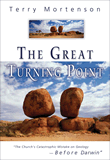A Gap in Knowledge
A well-known US “televangelist” (i.e. television preacher), who frequently appears on the Trinity Broadcasting Network (TBN), recently promoted the compromise view known as the “gap theory,” and did so by completely ignoring the meaning of original Hebrew text in Genesis. (Because some in the Christian community are trying to correct this brother, we will keep his identity hidden.)
The gap theory is an attempt by some Christians to make Genesis fit a belief that the Earth is millions of years old. They try to fit the so-called “geological ages” of millions of years between the first two verses of Genesis 1 (although generally they oppose “molecules-to-man evolution’).
The gap theory is an attempt by some Christians to make Genesis fit a belief that the Earth is millions of years old.
To support his view of the gap theory, this televangelist cited Genesis 1:28 and the King James Version phrase “replenish the earth.” He claimed that the word replenish here means “refill,” arguing that before Adam, a group of people lived and died before the six days of Creation (presumably perishing as a result of what some people have called “Lucifer’s Flood’).
The word “replenish” in the King James Version, however, was used in the seventeenth century (when the King James Version was translated) to simply mean “fill.” According to the Oxford English Dictionary, it did not mean “re-fill” at the time the translators worked on the King James Bible. It was taken to express such ideas as to stock, fill, supply, or inhabit. Note that we don’t have “plenish” and “replenish” (like “fill” and “refill”. “Replenish” comes from the word “replete’; being “replete” with happiness is being “full” with happiness.
The first use of the word replenish to mean “to fill again” occurred in 1612, one year after the King James Version was published. Furthermore, it was used in a poetic sense, and certainly Genesis 1:28 is not poetry. The English word has changed meaning over the centuries, so that the word replenish today could also mean “refill.”
The original Hebrew word for “replenish” in Genesis 1:28 is male. This word simply means “fill,” and is translated that way in the King James elsewhere (e.g. Genesis 1:22). So neither the Hebrew word nor the English word chosen by the King James Version translators meant at that time “refill.” The translators” choice of “replenish” may have been meant to convey something “akin” to “fill up” (i.e. to “make replete (full)”), but they were certainly not trying to convey anything about another filling of the Earth. The linguist Dr Charles Taylor has thoroughly analysed the Hebrew and English in “What Does ‘Replenish the Earth’ Mean?,” and shown that the “gap theory” cannot be sustained.
Leaving the vocabulary aside, there is an important Biblical doctrine at stake here. Those who hold to a gap theory do so in order to accept the millions of years before Adam, and to explain the fossils. These fossils, however, show overwhelming evidence of death, disease, and suffering, which they would therefore have to put before the Fall of Adam. (Many also believe that there were human-like creatures—‘hominids’—before Adam.) As we have written about many times on this Web site, this makes a mockery of the atonement message (i.e. Adam’s fall and need of reconciliation with a holy God). (See “The Necessity for Believing in Six Literal Days.”)
The televangelist’s gaffe is a lesson to us all to study to show ourselves approved unto God, workmen that need not be ashamed, “rightly dividing the word of truth” (2 Timothy 2:15).
Recommended Resources

Answers in Genesis is an apologetics ministry, dedicated to helping Christians defend their faith and proclaim the good news of Jesus Christ.
- Customer Service 800.778.3390
- Available Monday–Friday | 9 AM–5 PM ET
- © 2026 Answers in Genesis





